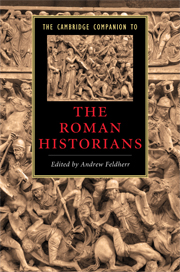Book contents
- Frontmatter
- Introduction
- Part I Approaches
- Part II Contexts and Traditions
- Part III Subjects
- Part IV Modes
- 12 The rhetoric of Roman historiography
- 13 The exemplary past in Roman historiography and culture
- 14 Intertextuality and historiography
- Part V Characters
- Part IV Transformations
- Chronological list of the historians of Rome
- Bibliography
- Index
14 - Intertextuality and historiography
from Part IV - Modes
Published online by Cambridge University Press: 28 November 2010
- Frontmatter
- Introduction
- Part I Approaches
- Part II Contexts and Traditions
- Part III Subjects
- Part IV Modes
- 12 The rhetoric of Roman historiography
- 13 The exemplary past in Roman historiography and culture
- 14 Intertextuality and historiography
- Part V Characters
- Part IV Transformations
- Chronological list of the historians of Rome
- Bibliography
- Index
Summary
The Annals of Tacitus begin at the death of Augustus, whose funeral is narrated in chapters 8-10 of the first book. The ninth and tenth chapters, beginning “then there was much talk about Augustus himself,” record various interpretations of the emperor's life current at the time of his death; as has been “recognized” for nearly a century, these chapters contain precise and pointed allusions to Augustus' self-representation in the text entitled Res Gestae Divi Augusti (henceforth RGDA). Chapter 10 of the Annals, in particular, tellingly re-phrases Augustus' account of his activities in the aftermath of Julius Caesar's death: “At the age of nineteen I raised an army on my own initiative and at my own expense, with which I recovered the freedom of the Republic, which had been suppressed by the domination of a faction. On account of this the Senate, in the consulship of Gaius Pansa and Aulus Hirtius, decreed in my honor that I be enrolled as a senator, giving me the right to speak in the consular position, and bestowed on me imperium. The Senate also commanded me as propraetor, together with the consuls, to see to it that no harm should come to the state. But the people, in the same year, when both consuls had fallen in battle, made me consul and triumvir for the maintenance of the Republic. (RGDA 1.1-4)”
- Type
- Chapter
- Information
- The Cambridge Companion to the Roman Historians , pp. 231 - 242Publisher: Cambridge University PressPrint publication year: 2009
- 6
- Cited by

